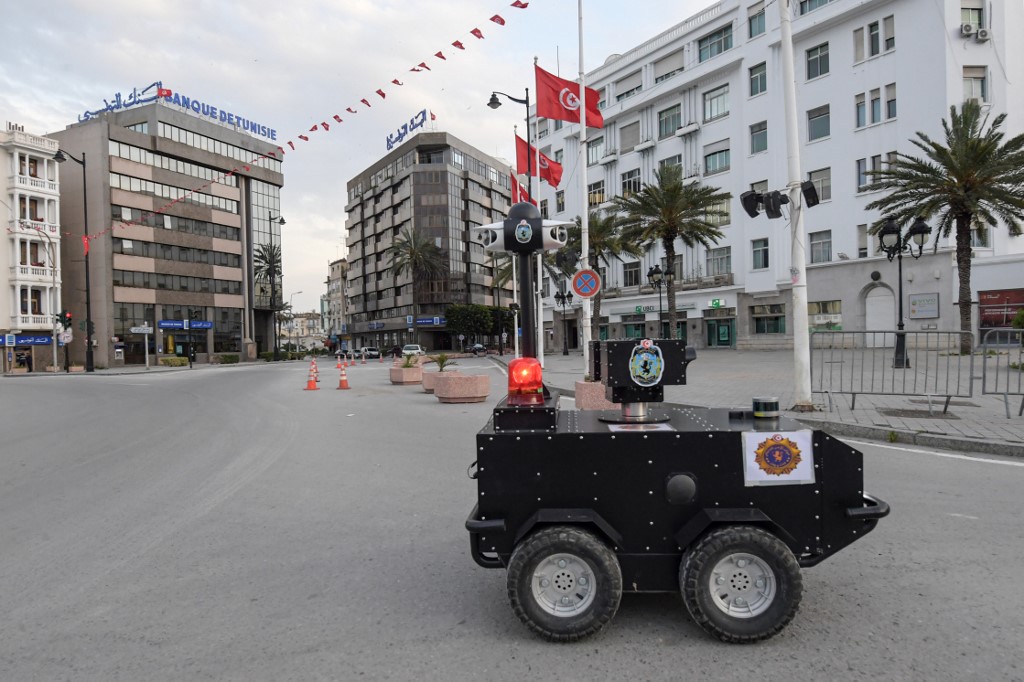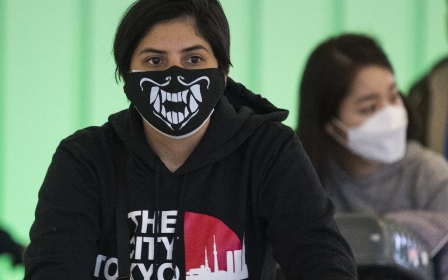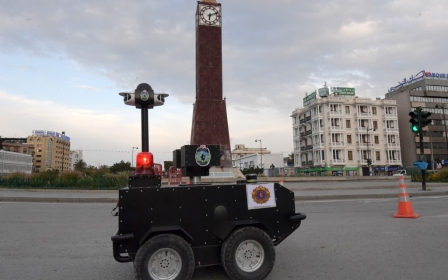Coronavirus: Why digitisation is a double-edged sword for the Middle East

In their fight against the coronavirus outbreak, countries across the Middle East are looking for digital solutions. Education technology and online shopping have offered respite during curfews. Digitisation may also boost the region’s economic recovery once the crisis recedes.
But the same technology is a double-edged sword, providing governments with powerful means to track their own citizens, and enabling increased human rights abuses.
Amid volatile oil prices and the Covid-19 pandemic, digitisation in the Middle East and North Africa region is at a crossroads. Europe has an opportunity and a responsibility to promote its expertise on digital rights, helping to ensure that states in the region use technology not to violate human rights, but as a tool for economic and social development.
Digital transformation
The MENA region has been going through a large-scale digital transformation in recent years, as more and more people come online. The coronavirus outbreak and plunging oil prices have thrown up new challenges, but also opportunities for the region’s nascent digital economy, as governments scramble to shield their states from recession.
New MEE newsletter: Jerusalem Dispatch
Sign up to get the latest insights and analysis on Israel-Palestine, alongside Turkey Unpacked and other MEE newsletters
With unemployment figures skyrocketing amid Covid-19, the region’s persistent youth unemployment crisis will become even more acute. This will not only affect GDP growth, but it could also exacerbate the socioeconomic ills at the heart of much of the instability over the past decade. Strengthening the Middle East’s digital economy - and its ability to generate youth employment - could be an important remedy.
There are heightened concerns that authorities may use the outbreak as cover to bolster existing cyber-surveillance efforts
Some parts of the Middle East’s digital economy have grown during the pandemic. As coronavirus forces Middle Eastern consumers online - some for the first time - digital startups offering services in education, shopping, communication, and health and fitness stand to gain the most.
But it will still be an uphill struggle for many startups to raise substantial funding in this uncertain economic environment. According to a survey conducted by entrepreneurship platforms Wamda and Arabnet, more than 70 percent of startups based in the MENA region said they had witnessed a negative impact on their business due to Covid-19.
Threat to human rights
In addition, as the MENA region digitises, technology poses a threat to human rights. In recent years, governments across the region have purchased cyber-surveillance technology, including from European and US companies, enabling them to spy on their citizens at home and abroad. Gulf states have reportedly used software developed by Israel’s NSO Group to spy on dissidents, including the late journalist Jamal Khashoggi.
An additional threat to digital rights is China’s increasing involvement in upgrading the MENA region’s digital infrastructure. Beijing has hosted sessions on censorship and surveillance with officials from states such as Egypt, Jordan, Saudi Arabia and the UAE.
According to media reports from mid-March, around a dozen countries were testing software developed by Israel’s NSO Group to track the spread of coronavirus. While this could offer important public health benefits, there are heightened concerns that authorities may use the outbreak as cover to bolster existing cyber-surveillance efforts targeting local populations.
Under the shadow of managing the Covid-19 outbreak, Palestinians looking to verify whether their permits to remain in Israel were still valid were advised by Israeli authorities to download an app giving the military access to their mobile phones, including their location and files.
Dubai police announced in April that they would use artificial intelligence and speed radars to identify whether people moving around during a 24-hour coronavirus sterilisation programme were essential workers. The system could reportedly follow people during their entire trip and judge whether they took a direct route from home to work and back.
Europe's role
According to a report in Vice, an app falsely promoted by the Iranian government as a way to determine whether someone was infected with coronavirus instead stored a lot of data on citizens, such as their names, addresses and dates of birth. The app was reportedly also able to track users’ locations in real time.
An investigation by human rights watchdog Amnesty International found that a mandatory contact-tracing app in Qatar had serious security vulnerabilities that briefly put sensitive personal information at risk, including names, national IDs, health status and location data. Amnesty International reported that Qatari authorities fixed the vulnerability after being alerted to it.
Lockdowns across the Middle East have prompted calls by human rights organisations to permanently lift a ban on voice over internet protocol (VoIP) services in the UAE, Qatar and Oman. Restrictions have been relaxed during the Covid-19 outbreak, but popular VoIP apps such as WhatsApp, FaceTime and Skype remain severely restricted/mostly blocked - a significant challenge for the large number of migrant workers who rely on the internet to communicate with their families back home.
The European Union needs to do more to prevent Europe-based companies from facilitating human rights abuses by exporting cyber-surveillance technology. It can do so by pushing for the establishment of an autonomous EU export control list for dual-use items that includes a broad range of the latest cyber-surveillance technology. Such a move would help Brussels boost its positioning as a human rights leader on the world stage.
Battling inequality
As a regulatory superpower, the EU also has the ability and responsibility to support the responsible growth of the digital economy beyond the reach of European companies. To support the MENA region’s economic recovery, the EU should help governments build policy frameworks and regulations conducive to the growth of the digital economy.
Europe should also use its regulatory expertise to promote the protection of human rights in the Middle East
Europe should also use its regulatory expertise to promote the protection of human rights in the Middle East. Moving to counter the spread of China’s restrictive internet governance model also aligns with the EU’s geopolitical interests in fostering economic development and stability in its southern neighbourhood.
As many regional economies continue to suffer from the effects of Covid-19, Europe should seize this pivotal moment to support economic development and battle inequality in the Middle East.
The views expressed in this article belong to the author and do not necessarily reflect the editorial policy of Middle East Eye.
Middle East Eye delivers independent and unrivalled coverage and analysis of the Middle East, North Africa and beyond. To learn more about republishing this content and the associated fees, please fill out this form. More about MEE can be found here.







